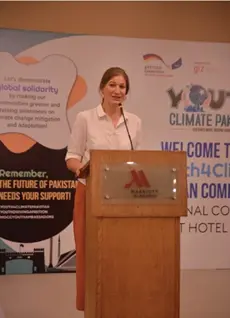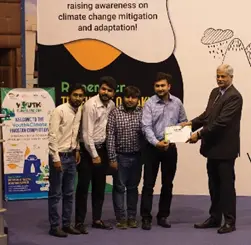Our pivotal role in supporting the Clean Green Pakistan Index (CGPI) Third Party Monitoring (TPM) visits across the 32 cities of Khyber Pakhtunkhwa (KPK), Punjab, Balochistan, and Gilgit-Baltistan exemplifies CHEF International's unwavering commitment to environmental sustainability and community development. Throughout the assignment, CHEF International demonstrated exemplary dedication, providing invaluable support and facilitation that significantly contributed to the success of the endeavor.
In the realm of drinking water management, CHEF International spearheaded initiatives aimed at ensuring access to clean and potable water for communities across the regions. Through strategic partnerships and innovative approaches, we addressed challenges related to water quality, distribution, and conservation. Our efforts included the implementation of water purification systems, capacity-building workshops on water sanitation, and the establishment of community-led water management committees. By empowering local stakeholders and leveraging sustainable technologies, we aimed to enhance water security and improve public health outcomes.
Solid waste management emerged as another focal point of our intervention, where CHEF International implemented comprehensive strategies to address the pressing issue of waste accumulation and disposal. Through community mobilization campaigns and infrastructure development projects, we promoted waste segregation at source, established recycling facilities, and introduced environmentally friendly waste disposal methods. Additionally, we conducted awareness sessions on waste reduction and recycling practices, encouraging behavioral changes among residents and fostering a culture of responsible waste management. Our holistic approach aimed to mitigate environmental pollution, conserve natural resources, and promote a circular economy paradigm conducive to sustainable development.
Sanitation and hygiene promotion were integral components of our multi-sectoral approach to community development. Recognizing the direct link between sanitation, hygiene, and public health, CHEF International implemented initiatives to improve sanitation infrastructure, promote hygienic practices, and raise awareness about the importance of personal hygiene. Through the construction of sanitation facilities, such as toilets and handwashing stations, and the implementation of hygiene education programs in schools and communities, we aimed to reduce the prevalence of waterborne diseases and improve overall wellbeing. Moreover, our efforts extended to behavior change communication campaigns, advocating for improved sanitation practices and fostering a culture of cleanliness and hygiene consciousness among the populace.
Plantation initiatives formed the cornerstone of our environmental conservation efforts, reflecting our commitment to biodiversity preservation and ecosystem restoration. CHEF International facilitated large-scale tree planting campaigns, engaging communities in afforestation activities and reforestation projects across urban and rural landscapes. By promoting native species cultivation and sustainable land management practices, we aimed to combat deforestation, mitigate the adverse effects of climate change, and enhance ecological resilience. Furthermore, our plantation programs provided socio-economic benefits to local communities, generating employment opportunities, enhancing green spaces, and improving air quality. Through collaborative partnerships and community participation, we endeavored to create a greener, more sustainable future for generations to come.


